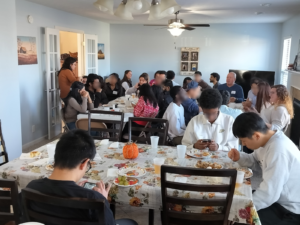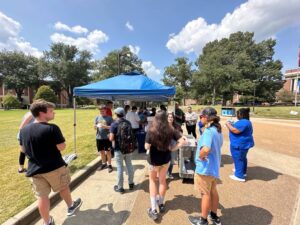“And [Jesus] went up on the mountain and called to him those whom he desired, and they came to him. And he appointed twelve (whom he also named apostles) so that they might be with him and that he might send them out to preach…” Mark 3:13-14
As we say yes to Jesus’ invitation to follow Him, we enter a relationship where we are called and desired, where He shares all of life with us and we share all of life with Him, and where He enables us to live His life in this world. We become His disciples.
Ultimately, God will conform us to the image of his Son (Romans 8:29). This is our destiny. Our Master Craftsman is so creative that He can and will use all our external circumstances and internal dynamics for this ultimate purpose. The theological term for this is “sanctification.” The process can be called “spiritual formation.” This is the process of being formed in the image of Christ for the sake of others (Invitation to a Journey, M. Robert Mulholland, 17). It is a work of God that is wrought by grace from start to completion (Ephesians 2:8, 9). Yet we also have the capacity to participate with God in this process by practices that we call “discipleship.”
We partner with God by our active cooperation with his work in our lives. Notice the balance: “…work out your salvation with fear and trembling (sounds like it depends on us), for it is God who works in you, both to will and to work for his good pleasure (sounds like it depends on God).” “His divine power has granted to us all things that pertain to life and godliness, through the knowledge of him who called us to his own glory and excellence…” (2 Peter 1:3) He has provided all we need to become like him…“For this very reason, make every effort to supplement your faith with virtue, and virtue with knowledge…” (2 Peter 1:5) Therefore, we are asked to strive for virtues.
Which is it? Is our Christlikeness a work of God alone? Do we have a contribution to make? The answer is…yes. We do those things we can do (such as engage with scripture, prayer, fellowship, witness, and service), and He does those things we cannot do. He transforms us.
As you read the Gospels, notice that Jesus often asks those around Him to do something that they can do, and then He does what they cannot do: Servants fill jars with water; Jesus transforms them into wine. A boy shares his lunch; Jesus feeds a multitude. Friends roll back a stone; Jesus calls Lazarus from the dead.
As Jesus’ disciples (sharing His calling and His life with others), we participate with Him as He transforms our lives and seeks and saves the lost. In this way, “we are to grow up in every way into him, who is the head, into Christ, from whom the whole body, joined and held together by every joint with which it is equipped, when each part is working properly, makes the body grow so that it builds itself up in love.” (Ephesians 4:15, 16)
Discipleship happens in all sorts of situations and relationships: daily life and special occasions; in solitude, one-on-one, and groups of various sizes; through things that we choose and things that happen to us… And in those mysterious ways that can only be accounted for by a work of the Spirit. Jesus said, “The Kingdom of God is as if a man should scatter seed on the ground (something a person can do). He sleeps and rises night and day, and the seed sprouts and grows; he knows not how (the work of God)… When the grain is ripe, at once he puts in the sickle, because the harvest has come (again, something to be done by a person who can do it).” (Mark 4:26, 27, 29)
Peter concluded his letters to believers scattered abroad by persecution by asking this blessing for them: “But grow in the grace and knowledge of our Lord and Savior Jesus Christ. To him be the glory both now and to the day of eternity. Amen.” 2 Peter 3:18
RESOURCES FOR MORE READING ON DISCIPLESHIP
• Celebration of Discipline by Richard J. Foster.
• Invitation to a Journey: A Road Map for Spiritual Formation by M. Robert Mulholland.
• Spirit of the Disciplines: Understanding How God Changes Lives by Dallas Willard.
• Spiritual Disciplines Handbook: Practices that Transform Us by Adele Ahlberg Calhoun.
• The Good and Beautiful God: Falling in Love with the God Jesus Knows by James Bryan Smith.
FINAL THOUGHT
You have heard of the cost of discipleship. Dallas Willard considers the cost of nondiscipleship: “Nondiscipleship costs abiding peace, a life penetrated throughout by love, faith that sees everything in the light of God’s overriding governance for good, hopefulness that stands firm in the most discouraging of circumstances, power to do what is right and withstand the forces of evil. In short, nondiscipleship costs you exactly that abundance of life Jesus said he came to bring (John 10:10). The cross-shaped yoke of Christ is, after all, an instrument of liberation and power to those who live in it with him and learn the meekness and lowliness of heart that brings rest to the soul.” Spirit of the Disciplines






